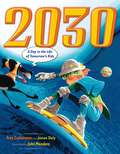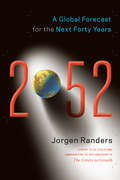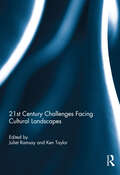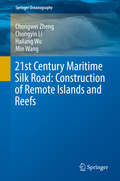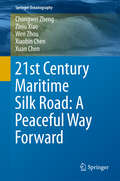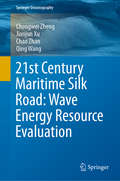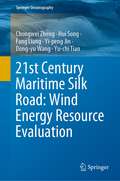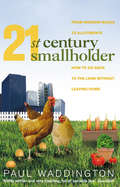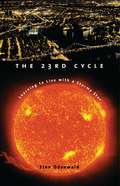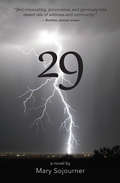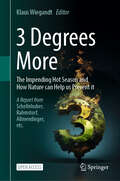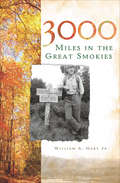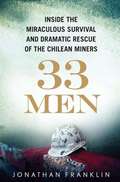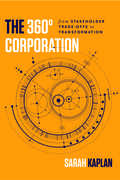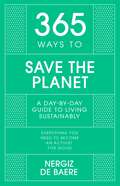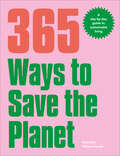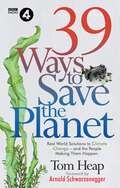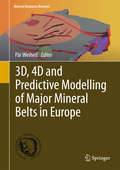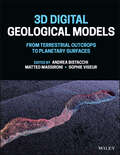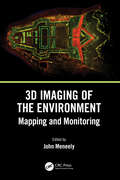- Table View
- List View
2030: A Day in the Life of Tomorrow's Kids
by Amy Zuckerman James DalyWinner of the 2012 Grand Canyon Reader Award for a Non-fiction bookGlobal events and new technology change how we live from moment to moment. So, what will our world be like in twenty years? Come take a look as futurists Amy Zuckerman and James Daly examine what a kid?s daily life might be like in the year 2030. Inspired and informed by trends and scientifi c and technological research, 2030 is not only a peek at some cool future gadgets (talking dog collars, cars that drive themselves), but also a thoughtful examination of how our lives might be impacted as we adjust to environmental change.
2052: A Global Forecast for the Next Forty Years
by Jorgen RandersForty years ago,The Limits to Growthstudy addressed the grand question of how humans would adapt to the physical limitations of planet Earth. It predicted that during the first half of the 21st century the ongoing growth in the human ecological footprint would stop-either through catastrophic "overshoot and collapse"-or through well-managed "peak and decline. "So, where are we now? And what does our future look like? In the book2052, Jorgen Randers, one of the co-authors ofLimits to Growth, issues a progress report and makes a forecast for the next forty years. To do this, he asked dozens of experts to weigh in with their best predictions on how our economies, energy supplies, natural resources, climate, food, fisheries, militaries, political divisions, cities, psyches, and more will take shape in the coming decades. He then synthesized those scenarios into a global forecast of life as we will most likely know it in the years ahead. The good news: we will see impressive advances in resource efficiency, and an increasing focus on human well-being rather than on per capita income growth. But this change might not come as we expect. Future growth in population and GDP, for instance, will be constrained in surprising ways-by rapid fertility decline as result of increased urbanization, productivity decline as a result of social unrest, and continuing poverty among the poorest 2 billion world citizens. Runaway global warming, too, is likely. So, how do we prepare for the years ahead? With heart, fact, and wisdom, Randers guides us along a realistic path into the future and discusses what readers can do to ensure a better life for themselves and their children during the increasing turmoil of the next forty years.
21st Century Challenges Facing Cultural Landscapes
by Juliet Ramsay and Ken TaylorThrough stories of diverse landscapes from around the world, this book captures human cultures and their land use practices in the environments they inhabit. The chapters cover topics from heritage in the 21st Century, appreciating and safeguarding values while facing challenges wrought by change.This title will lead readers through fascinating stories of landscapes and people. We learn of the physical and spiritual structure of rice terraces of the Honghe Mountains in China maintained by following a 1300 year sustainable practice of water allocation, while the colonial tea plantations of the Sri Lankan highlands are managed by Indian Tamils who now seek tourism as a means of additional income. Sustainable agricultural methods in the USA are being introduced to prevent landscape loss while in Australia a challenge confronting family farms is progressing to rural industrialisation. Challenges are further outlined in the mythical story of Finland's Saint Henrik pilgrimage and in the intangible Ui-won gardens of Korea. The huge challenge for Japan's landscapes is the legacy from fierce natural 21st Century disasters while in Australia's Dampier Archipelago, an avoidable yet brutal development on a unique Aboriginal rock sculptured landscape highlights serious concerns about heritage governance. These remarkable stories of landscapes and their management are inseparable from the communities that inhabit them. This book was originally published as a special issue of Landscape Research.
21st Century Maritime Silk Road: Construction of Remote Islands and Reefs (Springer Oceanography)
by Chongwei Zheng Chongyin Li Hailang Wu Min WangThis book focuses on the construction of remote islands and reefs in the Maritime Silk Road. Firstly, it analyzes the functions, necessity and difficulties of the construction of remote islands and reefs; then provides corresponding countermeasures. According to the urgent demand of electricity and freshwater, it focus on wave and offshore wind energy evaluation of the important remote islands and reefs of the Maritime Silk Road, providing reference for the choice of location of power plants, daily operation and long term plan of wave/wind power generation. Several important key points are selected in the case study to realize their electricity and freshwater self-sufficiency and thus to improve their viability. This book also presents the marine characteristics (especially hazardous elements) under the demands of island runway construction and marine new energy development, to promote safe and efficient implementation of the remote islands and reefs construction. This book is one of the series of publications on the 21st Century Maritime Silk Road (shortened as “Maritime Silk Road”). It covers the characteristics of the marine environment and marine new energy, remote islands and reefs construction, climate change, early warning of wave disasters, legal escort, marine environment and energy big data construction, etc. contributing to the safe and efficient construction of the Maritime Silk Road. It aims to improve our knowledge of the ocean, thus to improve the capacity for marine construction, enhance the viability of remote islands and reefs, ease the energy crisis and protect the ecological environment, improve the quality of life of residents along the Maritime Silk Road, and protect the rights, interests of the countries and regions participating in the construction of the Maritime Silk Road. It will be a valuable reference for decision-makers, researchers, and marine engineers working in the related fields.
21st Century Maritime Silk Road: A Peaceful Way Forward (Springer Oceanography Ser.)
by Chongwei Zheng Ziniu Xiao Wen Zhou Xiaobin Chen Xuan ChenThis book focuses on understanding the characteristics of the marine environment; overall characteristic of the marine resources (especially the marine new energy) and their current utilization; important routes, channels, and ports; and the Maritime Silk Road from the perspective of international law. It also discusses the significance and opportunities of the Maritime Silk Road initiative, analyzes the challenges involved in the construction of the Maritime Silk Road and provides corresponding countermeasures. Based on the above research, this book also proposes to construct a comprehensive application platform for the Maritime Silk Road that will be a practical tool for decision-making. <P><P> This book is one of the series publications on the 21st century Maritime Silk Road (shortened as “Maritime Silk Road”). This series publications cover the characteristics of the marine environment and marine new energy, remote islands and reefs construction, climate change, early warning of wave disasters, legal escort, marine environment and energy big data construction, etc. contributing to the safe and efficient construction of the Maritime Silk Road. It aims to improve our knowledge of the ocean, thus to improve the capacity for marine construction, enhance the viability of remote islands and reefs, ease the energy crisis and protect the ecological environment, improve the quality of life of residents along the Maritime Silk Road, and protect the rights, interests of the countries and regions participating in the construction of the Maritime Silk Road. It will be a valuable reference for decision-makers, researchers, and marine engineers working in the related fields.
21st Century Maritime Silk Road: Wave Energy Resource Evaluation (Springer Oceanography)
by Chongwei Zheng Jianjun Xu Chao Zhan Qing WangThis book focuses on the evaluation of wave energy in the Maritime Silk Road. Firstly, it compares wave energy and other main energy sources, and then discusses the various disadvantages. It also presents the current research and the difficulties of wave energy evaluation, and systematically analyzes the climatic characteristics of the wave energy, including the temporal–spatial distribution and climatic trend of a series of key factors (e.g. wave power density, availability, richness, stability, energy direction, energy storage). It then describes the design of a short-term forecasting scheme and a long-term projection scheme of wave energy suitable for the Maritime Silk Road, to serve as a plan for the daily operation and long-term development of wave energy. Further, it highlights the wave energy analysis and decision-making in the context of the remote islands and reefs, using Sri Lanka is taken as a case study. Lastly, it presents the first wave energy resource dataset for the Maritime Silk Road.This book is one of a series of publications on the 21st century Maritime Silk Road (shortened as “Maritime Silk Road”) that covers the characteristics of the marine environment and marine new energy, remote islands and reef construction, climate change, early warning of wave disasters, legal escort, marine environment and energy big data construction, contributing to the safe and efficient construction of the Maritime Silk Road. It aims to improve our knowledge of the ocean, and so improve the capacity for marine construction, enhance the viability of remote islands and reefs, ease the energy crisis and protect the ecological environment and improve the quality of life of residents along the Maritime Silk Road, as well as to protect the rights, and interests of the countries and regions participating in the construction of the Maritime Silk Road. This book is a valuable reference resource for decision-makers, researchers, and marine engineers working in the related fields.
21st Century Maritime Silk Road: Wind Energy Resource Evaluation (Springer Oceanography)
by Chongwei Zheng Hui Song Fang Liang Yi-peng Jin Dong-yu Wang Yu-chi TianThis book aims to establish a wind energy evaluation system, to provide scientific reference for site selection, daily operation and long-term planning of wind power generation, thus to make contribution to breaking the shackles of power shortage. Firstly, it presents the advantages and disadvantages of offshore wind power, then further discusses about the status quo and challenges for wind power programs along the Maritime Silk Road and offer suggestions. A wind energy evaluation system was proposed with the Maritime Silk Road as a case study, including climatic features of wind power (temporal-spatial distribution), long-term climatic trend and mechanism, short-term forecast of wind energy, mid- and long-term projection of wind energy, technology of wind energy evaluation on key point or vital region and offshore wind energy dataset construction, to provide systematic and scientific reference for wind power evaluation and utilization.This book is one of the series of publications on 21st century Maritime Silk Road (shortened as “Maritime Silk Road”). It covers the characteristics of the marine environment and marine renewable energy, remote islands and reefs construction, climate change, early warning of wave disasters, legal escort, marine environment and energy big data construction, etc., contributing to the safe and efficient construction of the Maritime Silk Road. It aims to improve our knowledge of the ocean, thus, to improve the capacity for marine construction, enhance the viability of remote islands and reefs, ease the energy crisis and protect the ecological environment, improve the quality of life of residents along the Maritime Silk Road, and protect the rights, interests of the countries and regions participating in the construction of the Maritime Silk Road. It is a valuable reference for decision-makers, researchers, and marine engineers working in the related fields.
21st-Century Smallholder: From Window Boxes To Allotments: How To Go Back To The Land Without Leaving Home
by Paul WaddingtonAchieving genuine self-sufficiency of the kind described in John Seymour's classic guide is sadly beyond the vast reach of the urban majority today. Few have the space, and for those few there are comprehensive guidebooks. But where do the rest of us look for the answers to questions like how much effort does it really take to grow your own food? Is beekeeping difficult? Is solar power really worth the bother?From a small terraced house in the middle of a big city, Paul Waddington has made it his business to find out, and while trying it himself, has created a practical and absorbing guidebook along the way. It includes easy-to-read lists, tables, personal anecdote, and stunning illustrations, and more importantly demystifies the subject with practical tips that get to the heart of the matter to show you how you can enjoy the fulfilling aspects of the smallholding life without the hassle and expense of 'going all the way'. If you want to go back to the land without leaving home, this is the perfect guide.
The 23rd Cycle: Learning to Live with a Stormy Star
by Sten OdenwaldOn March 13, 1989, the entire Quebec power grid collapsed, automatic garage doors in California suburbs began to open and close without apparent reason, and microchip production came to a halt in the Northeast; in space, communications satellites had to be manually repointed after flipping upside down, and pressure readings on hydrogen tank supplies on board the Space Shuttle Discovery peaked, causing NASA to consider aborting the mission. What was the cause of all these seemingly disparate events? Sten Odenwald gives convincing evidence of the mischievous—and potentially catastrophic—power of solar storms and the far-reaching effects of the coming "big one" brewing in the sun and estimated to culminate in the twenty-third cycle in the year 2001 and beyond. When the sun undergoes its cyclic "solar maximum," a time when fierce solar flares and storms erupt, fantastic auroras will be seen around the world. But the breathtaking spectacles will herald a potentially disastrous chain of events that merit greater preparation than Y2K. Is anyone listening?The 23rd Cycle traces the previously untold history of solar storms and the ways in which they were perceived by astronomers—and even occasionally covered up by satellite companies. Punctuated with an insert containing dramatic color images showing the erupting sun, the book also includes a history of the record of auroral sightings, accounts of communications blackouts from the twentieth century, a list of industries sensitive to solar storms, and information about radiation and health issues.
29
by Mary Sojourner"Ever-ascending Sojourner cooks up wrenching sorrow and hilarious banter, environmental and moral conundrums, magnetizing characters, and a place of transcendent beauty in this intoxicating, provocative, and gloriously told desert tale of wildness and community, unexpected bonds and deep legacies, trauma and healing."-Donna Seaman, BOOKLIST (starred review) "This standout ecological novel from Arizona author Sojourner (Going Through Ghosts) features picturesque prose, a vivid western setting, and sharply drawn characters."-PUBLISHERS WEEKLY (starred review)"In Nell Walker, Mary Sojourner has created a character who discovers-in her own desperate way-the simple beauty in the interconnectedness of the natural world and the complexities we heap upon it. Written with passion and humor, 29 takes the reader on a journey of hope, humanity, and love."-Jana Richman, author of Riding in the Shadows of Saints, The Last Cowgirl, and The Ordinary Truth"29 is at the intersection of a local road to Nowhere and an interstate to Everywhere. Certainly Mary's prose and storytelling is crystalline and lovely, a kind of geode broth, filled with light and piquancy."-David Kranes, author of The Legend's Daughter and The National Tree"Sojourner's desert eyes not only see but transform what others dismiss and ignore. She brings readers deep into the dust and sparkle of the Mojave, forcing the reader to hear the people of the desert-their stories, their sorrows, and their fierce and fragile loves. 29 holds the ragged weeping desert open, then kisses closed her wounds. A love letter to what we frequently deem unloveable, 29 is a wide-armed triumph of hope."-Laraine Herring, author of Ghost Swamp Blues and Writing Begins with the Breath"This is a story that will stay with the readers and, perhaps, bring them home to their own place, and the importance of fighting for what you love."-Susan Lang, author of the Mojave novels trilogy"The language is sharp as a butcher's blade, the dialogue rings true and hard, and the story cuts deeply into its reader."-H. Lee Barnes, author of Cold Deck, The Lucky, and Car Tag"Sojourner's new novel, much like the desert landscapes in which it is set, will never speak to those who see the Mojave as an annoying blur between L.A. and Vegas, but those adventurous enough (or lost enough) to wander off I-15 will find a world bursting with fragile beauty, tenacious life, and rock hard truth."-Giles Carwyn, author of Queen of Oblivion
3-D Seismic Interpretation
by M. Bacon R. Simm T. RedshawThis book introduces geophysicists and geologists to the technique of interpreting 3-D seismic data. The topics it covers include basic structural interpretation and map-making; the use of 3-D visualization methods; interpretation of seismic amplitudes; the generation and use of AVO and acoustic impedance datasets; and time-lapse seismic mapping. Written by professional geophysicists with many years of working experience in the oil industry, the book will be indispensable for graduate students, researchers, and new entrants into the petroleum industry.
3 Degrees More: The Impending Hot Season and How Nature Can Help Us Prevent It
by Klaus WiegandtThis open access book describes in detail what life on this planet would be like if its average surface temperature were to rise 3 degrees Celsius above the preindustrial level. On this basis, the book argues that it is imperative to keep this temperature rise below 2 degrees Celsius. It then lays out a detailed plan of what politically feasible, cost-effective measures should now be taken to achieve this goal. In this context, the book provides detailed discussions of climate finance, climate education and nature-based solutions. The book has been translated into English from the original German version published in 2022, and contains an original foreword and preface.
3000 Miles in the Great Smokies
by William A. Hart Jr.A hiking memoir by &“a man whose soul is held in thrall by remote places in the Smokies where . . . rising trout and fog-laden valleys rule supreme&” (Jim Casada, The Literature of Hiking in the Smokies). Bill Hart has hiked, camped and fished in the Great Smoky Mountains National Park for more than forty years. In over three thousand miles of walking, he has recorded experiences and impressions that will delight readers of all ages. Whether exploring some of the most remote sections of the Smokies, angling for trout, meeting mountain folk, or marveling at the flora and fauna around him, Bill has a gift for heartfelt storytelling and a wealth of knowledge to share about the park. Join him for an unforgettable journey through a beloved national treasure. Includes photos &“[A] collection of essays and journal entries of over 40 years of hiking, camping and exploring in the Great Smoky Mountain National Park.&” —Go Knoxville &“A compilation of thoughts and reminiscences of his wonderful days and nights there.&” —Smoky Scout&’s Hiking Adventures
33 Men: Inside the Miraculous Survival and Dramatic Rescue of the Chilean Miners
by Jonathan Franklin<p>Having had unparalleled access to the Chilean mine disaster, award-winning journalist Jonathan Franklin takes readers to the heart of a remarkable story of human endurance, survival, and historic heroism. <p><i>33 Men</i> is the groundbreaking, authoritative account of the Chilean mine disaster, one of the longest human entrapments in history. Rushing to the scene when the miners were discovered, Franklin obtained a coveted "Rescue Team" pass and reported directly from the front lines of the rescue operation, beyond police controls, for six weeks. Based on more than 110 intimate interviews with the miners, their families, and the rescue team, Franklin's narrative captures the remarkable story of these men and women, in details shocking, beautiful, comedic, and heroic. <p>Gripping and raw with never-before-revealed details, <i>33</i> Men is a true story that reads like a thriller.</p>
The 360° Corporation: From Stakeholder Trade-offs to Transformation
by Sarah KaplanCompanies are increasingly facing intense pressures to address stakeholder demands from every direction: consumers want socially responsible products; employees want meaningful work; investors now screen on environmental, social, and governance criteria; "clicktivists" create social media storms over company missteps. CEOs now realize that their companies must be social as well as commercial actors, but stakeholder pressures often create trade-offs with demands to deliver financial performance to shareholders. How can companies respond while avoiding simple "greenwashing" or "pinkwashing"? This book lays out a roadmap for organizational leaders who have hit the limits of the supposed win-win of shared value to explore how companies can cope with real trade-offs, innovating around them or even thriving within them. Suggesting that the shared-value mindset may actually get in the way of progress, bestselling author Sarah Kaplan shows in The 360° Corporation how trade-offs, rather than being confusing or problematic, can actually be the source of organizational resilience and transformation.
365 Ways to Live Green
by Diane Gow McdildaIt's the choices we make every day that affect our world tomorrow...365 Ways to Live Green offers an extended list of opportunities to live with more care for the environment by educating, inspiring and motivating people to look at the choices that are made everyday, and challenging them to change their habits. Broken down into 365 tips, with two concise points per page, readers can use this book to learn to make better everyday choices, from picking safer cleaning products to alternative holidays - this is everyone's all-purpose guide to green living.
365 Ways to Live Green
by Diane Gow McDildaIt's the choices we make every day that affect our world tomorrow365 Ways to Live Green offers an extended list of opportunities to live with more care for the environment by educating, inspiring and motivating people to look at the choices that are made everyday, and challenging them to change their habits. Broken down into 365 tips, with two concise points per page, readers can use this book to learn to make better everyday choices, from picking safer cleaning products to alternative holidays-this is everyone's all-purpose guide to green living.
365 Ways to Live Green for Kids
by Sheri AmselIn the green conscious world we live in today, parents realize the importance of teaching the lessons of green living, early on. With this book, parents can encourage their children to be ecologically friendly with fun lessons such as: The three Rs: reducing waste, reusing materials, and recycling Why we should keep the air, oceans, and forests pollution free Why organic food is tastier--and better--for you How to protect plants and animals Earth Day celebrations Complete with tips for every day of the year--and activities for home, school, and during playtime--this book reveals how easy it is to be an ecofriendly family--and prepare for a better future together.
365 Ways to Save the Planet: A Day-by-day Guide to Living Sustainably (365 Series)
by Nergiz De BaereARE YOU READY TO CHANGE THE WORLD?365 WAYS TO SAVE THE PLANET is a full year's worth of daily wisdom, carefully selected to inspire you to take the urgent action our very existence desperately needs. You'll find actions and challenges, surprising facts about the climate crisis, templates for writing to political representatives, scientific explanations of important concepts, popular misconceptions about sustainability, and much more. 365 WAYS TO SAVE THE PLANET goes way beyond predictable sustainability advice about how to recycle. Here you'll discover the small stuff you can do every day to change the world. Because when you get the little things right, the big things follow.
365 Ways to Save the Planet: A Day-by-day Guide to Living Sustainably (365 Series)
by Nergiz De BaereARE YOU READY TO CHANGE THE WORLD?365 WAYS TO SAVE THE PLANET is a full year's worth of daily wisdom, carefully selected to inspire you to take the urgent action our very existence desperately needs. You'll find actions and challenges, surprising facts about the climate crisis, templates for writing to political representatives, scientific explanations of important concepts, popular misconceptions about sustainability, and much more. 365 WAYS TO SAVE THE PLANET goes way beyond predictable sustainability advice about how to recycle. Here you'll discover the small stuff you can do every day to change the world. Because when you get the little things right, the big things follow.
365 Ways to Save the Planet: A Day-by-day Guide to Sustainable Living
by Georgina Wilson-PowellStep up your sustainability and unlock your full eco potential with 365 easy, trackable changes. What if sustainability didn&’t have to be so complicated? 365 Ways to Save the Planet cuts through the noise and explains exactly how to live a &“greener&” lifestyle day by day. With its approachable ideas and achievable daily actions, anyone can up their sustainability score with this book on eco-friendly living. Georgina Wilson-Powell breaks down the significance of environmental statistics for issues big and small, and quantifies the difference low-effort, high-impact changes can make. In her year-long programme, each action is accompanied with a simple &“Impact Index&” to bring the statistics to life, making it easy to track your progress. Reflect positively on the impact you are having on the environment, across work, home, holiday, and more, for the duration of a full year. Dive into the pages of this superb sustainability book to discover: - Daily actions and reflections focus on different, key sustainability issues to build into your routine.- Pages include inspiring mottos, overarching statistics, and illustrations to create a bold, colourful course for the year.- An impact index accompanies each daily action helping you to measure your footprint and reflect on the difference you can make. This green-living guide presents the facts and suggests changes to readers&’ lifestyle for every day. If you want to make a difference but don&’t know where to begin, simply turn the page and start with day one, and learn how to break previous habits and shift your mindset. Being green has never been easier!
39 Ways to Save the Planet
by Tom HeapWe got ourselves into this. Here's how we can get ourselves out.We know the problem: the amount of biodiversity loss, the scale of waste and pollution, the amount of greenhouse gas we pump into the air... it's unsustainable. We have to do something. And we are resourceful, adaptable and smart. We have already devised many ways to reduce climate change - some now proven, others encouraging and craving uptake. Each one is a solution to get behind.In 39 Ways to Save the Planet, Tom Heap reveals some of the real-world solutions to climate change that are happening around the world, right now. From tiny rice seeds and fossil fuel free steel to grazing elk and carbon-capturing seagrass meadows, each chapter reveals the energy and optimism in those tackling the fundamental problem of our age. Accompanying a major BBC Radio 4 series in collaboration with the Royal Geographical Society, 39 Ways to Save the Planet is a fascinating exploration of our attempt to build a better future, one solution at a time. A roadmap to global action on climate change, it will encourage you to add your own solutions to the list.
3D, 4D and Predictive Modelling of Major Mineral Belts in Europe (Mineral Resource Reviews)
by Pär WeihedThis book presents the results of the major EU project Promine. For the first time there is now a European database available on mineral deposits, as well as 3D, 4D and predictive models of major mineral belts in Europe: Fennoscandia (Skellefteå and Vihanti-Pyhäsalmi), the Fore-Sudetic basin (Kupferschiefer deposits in Poland and Germany), the Hellenic belt in northern Greece, and the Iberian Pyrite belt and Ossa Morena zone in Spain and Portugal. The book also describes the modelling techniques applied and how different types of software are used for three- and four-dimensional modelling. Furthermore, fundamental descriptions of how to build the database structure of three-dimensional geological data are provided and both 2D and 3D predictive models are presented for the main mineral belts of Europe.
3D Digital Geological Models: From Terrestrial Outcrops to Planetary Surfaces
by Andrea Bistacchi Matteo Massironi Sophie Viseur3D DIGITAL GEOLOGICAL MODELS Discover the practical aspects of modeling techniques and their applicability on both terrestrial and extraterrestrial structures A wide overlap exists in the methodologies used by geoscientists working on the Earth and those focused on other planetary bodies in the Solar System. Over the course of a series of sessions at the General Assemblies of the European Geosciences Union in Vienna, the intersection found in 3D characterization and modeling of geological and geomorphological structures for all terrestrial bodies in our solar system revealed that there are similar datasets and common techniques for the study of all planets—Earth and beyond—from a geological point-of-view. By looking at Digital Outcrop Models (DOMs), Digital Elevation Models (DEMs), or Shape Models (SM), researchers may achieve digital representations of outcrops, topographic surfaces, or entire small bodies of the Solar System, like asteroids or comet nuclei. 3D Digital Geological Models: From Terrestrial Outcrops to Planetary Surfaces has two central objectives, to highlight the similarities that geological disciplines have in common when applied to entities in the Solar System, and to encourage interdisciplinary communication and collaboration between different scientific communities. The book particularly focuses on analytical techniques on DOMs, DEMs and SMs that allow for quantitative characterization of outcrops and geomorphological features. It also highlights innovative 3D interpretation and modeling strategies that allow scientists to gain new and more advanced quantitative results on terrestrial and extraterrestrial structures. 3D Digital Geological Models: From Terrestrial Outcrops to Planetary Surfaces readers will also find: The first volume dedicated to this subject matter that successfully integrates methodology and applications A series of methodological chapters that provide instruction on best practices involving DOMs, DEMs, and SMs A wide range of case studies, including small- to large-scale projects on Earth, Mars, the 67P/Churyumov-Gerasimenko comet, and the Moon Examples of how data collected at surface can help reconstruct 3D subsurface models 3D Digital Geological Models: From Terrestrial Outcrops to Planetary Surfaces is a useful reference for academic researchers in earth science, structural geology, geophysics, petroleum geology, remote sensing, geostatistics, and planetary scientists, and graduate students studying in these fields. It will also be of interest for professionals from industry, particularly those in the mining and hydrocarbon fields.
3D Imaging of the Environment: Mapping and Monitoring
by John MeneelyThis is a comprehensive, overarching, interdisciplinary book and a valuable contribution to a unified view of visualisation, imaging, and mapping. It covers a variety of modern techniques, across an array of spatial scales, with examples of how to map, monitor, and visualise the world in which we live. The authors give detailed explanations of the techniques used to map and monitor the built and natural environment and how that data, collected from a wide range of scales and cost options, is translated into an image or visual experience. It is written in a way that successfully reaches technical, professional, and academic readers alike, particularly geographers, architects, geologists, and planners. FEATURES Includes in-depth discussion on 3D image processing and modeling Focuses on the 3D application of remote sensing, including LiDAR and digital photography acquired by UAS and terrestrial techniques Introduces a broad range of data collection techniques and visualisation methods Includes contributions from outstanding experts and interdisciplinary teams involved in earth sciences Presents an open access chapter about the EU-funded CHERISH Project, detailing the development of a toolkit for the 3D documentation and analysis of the combined coastline shared between Ireland and Wales Intended for those with a background in the technology involved with imaging and mapping, the contributions shared in this book introduce readers to new and emerging 3D imaging tools and programs.
